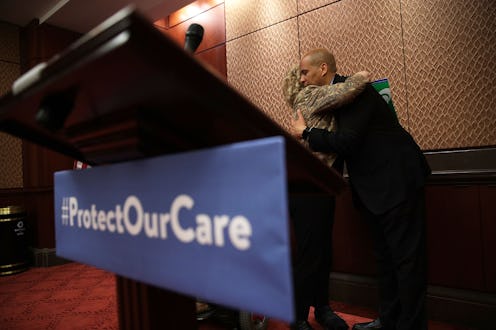News
The New Health Care Bill Will Gut Special Education Funding

There's been a lot of uproar about how the new Republican version of the health care bill would strip coverage from millions of people, including some of the country's most vulnerable citizens. Lost in the hubbub, though, is another vulnerable group that would lose coverage. The American Health Care Act would seriously hurt special education funding because of changes to the structure of Medicaid, but no one's really been talking about it. UPDATE: The AHCA has officially passed the House with a majority of votes, 217 to 213.
As it stand now, schools get funding through Medicaid to serve students with disabilities. The program pays for therapists, equipment, and preventative care for students who are eligible. Schools are required by law to serve students with disabilities, so they apply to Medicaid for reimbursements. But now, with the AHCA's changes to Medicaid funding, schools will no longer be eligible for Medicaid funding — and there will be a cap on how much money each state can receive through the program. Before, states received money based on what they had to provide — but now, they'll get a set "block grant" instead of a changing amount based on what they use.
According to a coalition of schools and advocates, this will amount to a move forcing states to "ration health care for children."
This isn't exactly money frivolously spent. While the GOP's cuts to Medicaid will cut the national deficit, it could also force schools to drastically cut spending on special education. But they would still have to comply with the Individuals With Disabilities Education Act, so the lack of reimbursements from Medicaid would just end up putting huge strain on school systems as they attempt to provide for all of the students in their districts. The bill also includes per-capita caps on certain populations served by Medicaid, including children and the elderly.
In their effort to make a bill palatable to the most conservative elements of society, House Republicans have crafted a bill that will, among all of its other shortcomings, also stop paying for the equipment and therapists that help students with disabilities become functioning members of society. It may reduce the deficit by slashing benefits, but without health care and education as children, these kids will end up drawing on the system far more than they would otherwise. While the GOP is celebrating what cutting Medicaid funding by 25 percent will achieve, they're ostensibly not thinking about what it will take away — but other people are.
"Our most vulnerable citizens are going to be suffering the most. If any legislator votes for this, it’s unconscionable," John George, executive director of the Montgomery County Intermediate Unit in Pennsylvania, told The New York Times. As of right now, House Republicans, in their determination to get a legislative victory and a victory on this particular front, seem unmoved by appeals like these.